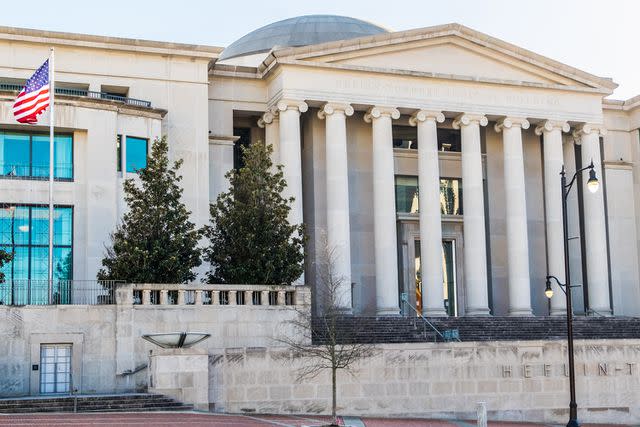Alabama Supreme Court Rules Frozen Embryos Are Children, Jeopardizing IVF Possibilities
"The Wrongful Death of a Minor Act applies on its face to all unborn children, without limitation," Justice Jay Mitchell wrote in Friday's ruling

Getty
The Heflin-Torbert Judicial BuildingFrozen embryos will legally be considered children under a new Alabama Supreme Court ruling.
The decision comes as a result of a wrongful death lawsuit brought by couples whose frozen embryos were destroyed at a fertility clinic in December 2020 when a patient entered a cryogenic nursery storage unit and removed several embryos.
"The subzero temperatures at which the embryos had been stored freeze-burned the patient's hand, causing the patient to drop the embryos on the floor, killing them," a decision released by the Alabama Supreme Court on Friday reads.

Getty
Stock image of a court gavelA lawsuit was filed against the clinic and the Center for Reproductive Medicine, alleging negligence and that Alabama's Wrongful Death of a Minor Act had been violated. After a trial court dismissed the claims, the plaintiffs filed an appeal.
"The parties to these cases have raised many difficult questions, including ones about the ethical status of extrauterine children, the application of the 14th Amendment to the United States Constitution to such children, and the public-policy implications of treating extrauterine children as human beings," Justice Jay Mitchell wrote in Friday's ruling.
"But the Court today need not address these questions because, as explained below, the relevant statutory text is clear: the Wrongful Death of a Minor Act applies on its face to all unborn children, without limitation," Mitchell continued.
Per Friday's decision, unborn children are to legally be considered children "without exception based on developmental stage, physical location, or any other ancillary characteristics."
Related: Supreme Court Overturns 'Roe v. Wade,' Eliminating the Constitutional Right to Abortion

Getty
An exterior view of the Alabama Supreme Court buildingMany spoke out against the decision, arguing about its potential to jeopardize IVF treatments. Barbara Collura, CEO of RESOLVE: The National Infertility Association, told the Associated Press that the ruling could lead to patients questioning if they can freeze future embryos, or if they can destroy or donate unused embryos.
"Alabama's Supreme Court ruling is a terrifying development for the 1 in 6 people impacted by infertility who need in-vitro fertilization to build their families," RESOLVE said in a statement shared on its website.
Never miss a story — sign up for PEOPLE's free daily newsletter to stay up-to-date on the best of what PEOPLE has to offer, from celebrity news to compelling human interest stories.
"RESOLVE mourns with the couples who lost their embryos as we know how many challenges people with infertility face when trying to build their family. Unfortunately, this anti-family ruling will likely have devastating consequences, including impacting the standard of care provided by the state's five fertility clinics," the statement continued.
For more People news, make sure to sign up for our newsletter!
Read the original article on People.

